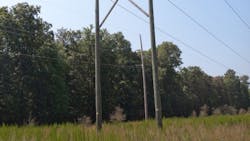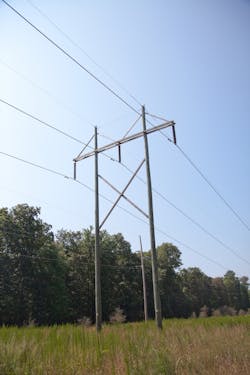Controlling Vegetation is Key to Safe, Reliable Power
Reliability is the most important attribute for a successful power utility company. As the backbone of our nation’s energy program, reliable electricity supply along utility lines means power continues flowing to homes and hospitals in the heat of summer. Controlling vegetation in utility rights of way and at substations is essential to keeping crews out of harm’s way.
First and foremost, no trees, vines, brush or grasses can be allowed to grow big enough to interfere with power lines or substations, notes Mike Standish, vegetative management territory manager for Crop Protection Services, Timberland Division. "Second, you need to make sure repair crews have clear access to rights of way."
Controlling Vegetation is Key to Safe, Reliable Power
Herbicide treatments are an important part of the integrated vegetation management (IVM) programs Standish develops for his western Texas clients. "Mechanical control is still necessary in utility rights of way, but herbicides are the most effective tool," he says. "When you clear areas mechanically, the brush resprouts. In three to four years it has grown back, usually with more trunks. When you look at an IVM plan over several years, herbicides cost less and do more to help deliver safe, reliable power.
"With mechanical control, you spend the same for each pass, but with herbicide control your costs go down with each treatment as you reduce brush density," he says. "Then you’re able to do other things with the savings."
A Plan That Retains Native Plants
Miles-long utility rights of way call for a different vegetation management strategy than areas around power generators and substations. "You want to keep as much of the desirable vegetation in utility rights of way as possible," says Standish. "In many cases, they create great areas for wildlife."
Because it’s common for rights of way to cross or run up to pastures, wetlands, nature trails or recreational areas, they should look as natural as possible, adds Mike Foley, operations manager for Superior Forestry, so careful management is essential. Managing vegetation in utility rights of way is just one service the company provides to clients around the country.
For one North Carolina utility alone, Superior Forestry maintains 16,000 line acres, primarily with crews using cutting tools and backpack sprayers filled with low-volume herbicides. "Our goal is to spray less area with each successive treatment as brush is controlled. Spot applications also are more grass-friendly."
Worker Safety Is Essential
Foley enforces safety standards among his crews of workers. "Our customers expect us to be very conscious of safety, and we make sure all our workers understand that. They can encounter rough terrain, poison ivy, snakes and bees, and occasionally get cuts and scrapes."
While those things are hard to avoid, being safe with herbicide applications is much more controllable. "Our company expects them to use safe work habits, so safety training is mandatory," he adds. "We want all our workers to come away from a day’s work the way they started it – maybe a little tired, but in one piece."

